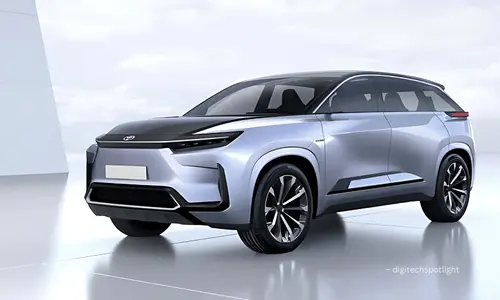Toyota presented their “bZ large SUV” concept several years back and speculation suggests this may evolve into the forthcoming bZ5x model. Americans’ love affair with large SUVs appears unbreakable as nearly half of the top 25 best-selling passenger cars last year were SUVs; as electric vehicle adoption increases rapidly however Toyota, as one of two second bestselling automakers behind Ford in America (behind Ford itself), still doesn’t provide an electric family SUV accommodating seven seats; Rivian, Kia Mercedes and Tesla already lead in this regard compared with Toyota being left far behind; although next year is likely to see changes!

Toyota currently only offers one electric car in the United States: its bZ4x crossover SUV. Lexus RZ450e and Subaru Solterra exist too, though both share similar technology but boast different exterior designs than that offered by Toyota. 2021 saw Japanese automaker Toyota unveil 15 futuristic electric vehicle concepts as part of its “beyond zero” offensive. These included a futuristic pickup truck from Toyota, Lexus supercar concepts and what Toyota called its bZ large SUV concept; to name only some examples. The bZ large SUV looks like an upgraded and mature version of its namesake car bZ4x, featuring a two-tone paint scheme consisting of silver for its body and black roof/hood/roofline/hood/roof/hood and taillamps. Like its counterpart it sports an eye-catching slim bar of chrome connecting its headlamps, an aerodynamic greenhouse design and what appears to be wraparound rear taillamps reminiscent of its namesake vehicle.
Official details may take some time, but for its size and class a dual motor all-wheel-drive configuration should come standard. We know Toyota has been working on multiple battery programs but lack information as to their progress; last year they revealed three involved new liquid electrolyte technologies with one using solid state batteries; they stated their goal as improving charging speeds, reaching higher energy density than current batteries while decreasing production costs while promising future vehicles would cover between 497-620 miles ranges.
Toyota is investing billions of dollars to manufacture electric vehicles (EVs) and produce batteries locally in America, and announced in June 2016 that its three-row electric SUV would be produced at an expanded plant located near Georgetown Kentucky. Japanese automaker Toyota plans on investing approximately 13.9 billion into battery production lines in North Carolina for use with BEVs, PHEVs and conventional hybrids. Toyota’s Kentucky plant will serve as the epicenter of lithium-ion battery production in North America. An equivalent Subaru model will also be manufactured there and similar Lexus models could soon follow; Lexus already trademarked both nameplates (TZ450e and 550e) with the European Union Intellectual Property Office.
No one expects that Toyota’s future electric model will come cheap; we anticipate it being priced above the current bZ4x, with its range-topping trim costing about $47,000; Kia’s EV9 family SUV costs between $55,000 and $74,000 and production should commence sometime around 2025-2026. In order to shake its “laggard in EV race” reputation–earned through delays with its own plans as well as outspoken climate lobbyist activities–Toyota needs its forthcoming EV model to succeed so it can silence critics while showing its true commitment towards decarbonizing its fleet fleet fleet operations and show its dedication towards decarbonisation by outperforming rival Kia EV9. Production should commence sometime around 2025-2026 and production begins sometime after 2026 or 2027-2026.